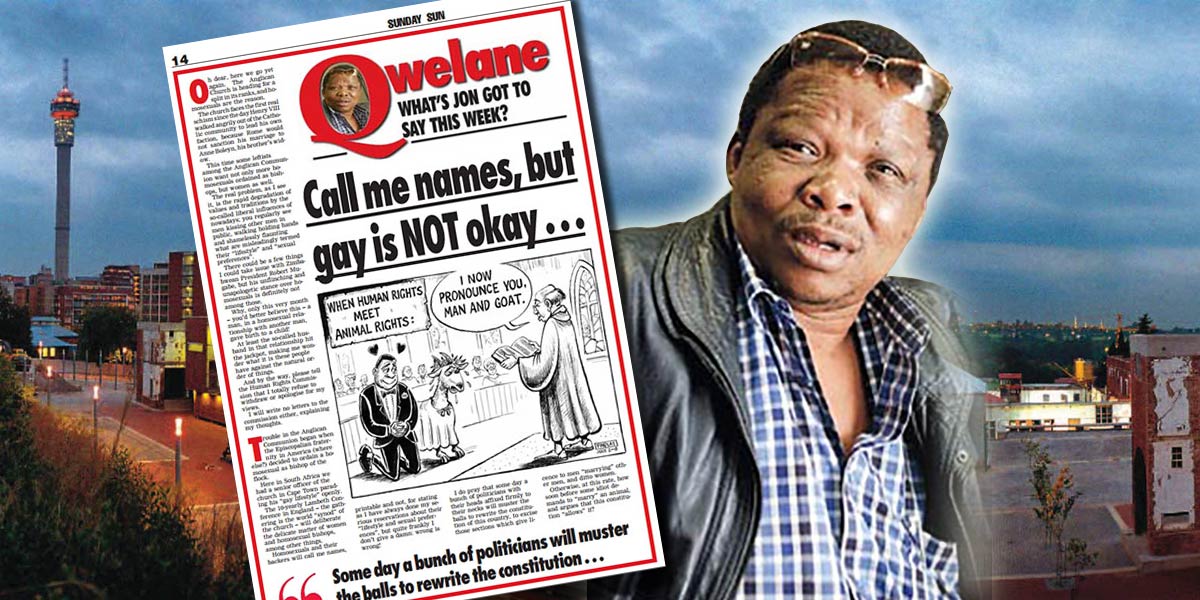Even in death Jon Qwelane is putting LGBTIQ+ lives at risk

The Jon Qwelane hate speech case is delaying the Hate Crimes Bill.
We’re being held to ransom. Months after his death, Jon Qwelane’s homophobia is still having a direct and deadly impact on the lives of LGBTIQ+ people in South Africa.
On Thursday, the Chairperson of Parliament’s Portfolio Committee on Justice and Correctional Services, Bulelani Magwanishe, finally offered an update on the status of the Prevention and Combating of Hate Crimes and Hate Speech Bill. This follows claims that Parliament and the government have failed to prioritise this important piece of legislation.
The passage and implementation of the Hate Crimes Bill are among the key demands by civil society groups who believe it will help address LGBTIQ+ murders which recently spiked, horrifying South Africans. In the past three months alone, eight known LGBTIQ+ individuals have been brutally slaughtered.
Once passed, the Bill would not only criminalise hate speech but would also create the legal definition of hate crimes. It would compel the authorities to collect and report details about these hate incidents for the “effective monitoring, analysis of trends and interventions and to provide quantitative and qualitative data.” Hate would also be considered an aggravating factor in sentencing.
According to Magwanishe, the Bill – which was drafted in 2016 and approved by Cabinet in 2018 – lapsed at the end of the 5th Parliament because the committee failed to hold public hearings on it “due to its heavy workload and the looming National Elections at the time.”
Magwanishe said in a statement that the committee has since then been “awaiting the Constitutional Court decision in a matter that has direct bearings on this legislation.” That is the Jon Qwelane hate speech case which dragged on for more than a decade in the courts until it was finally heard by the Constitutional Court on 22 September last year.
Concerning Qwelane’s infamous 2008 homophobic article, Call me names, but gay is NOT okay…, the case revolves around the constitutionality of limiting hate speech and how it should be defined. The court is also considering another case about 2009 statements by Cosatu’s Bongani Masuku about the Gaza War and whether this was hate speech directed at Jewish people or constitutionally protected political speech.
“We believe as a committee that it is prudent for us to await the Constitutional Court rulings on these matters to give us guidance as to the extent the committee can draft legislation limiting freedom of speech in regulating hate speech,” said Magwanishe.
The Hate Crimes Working Group (HCWG), however, has argued that the pending Constitutional Court decisions should not be a reason to delay the Bill, especially in light of the lives that are being lost.
In a letter to Parliament demanding answers last month, the HCWG said the Bill could still have been passed with a clause indicating that the possibly contentious provisions or chapter relating to hate speech be delayed in coming into operation until a future date.
“This has been done in respect of other pieces of legislation, and there is no reason why the same could not happen in respect of the Hate Crimes Bill,” said the HCWG.
To add to the crisis, it’s been reported that the Constitutional Court is struggling to finalise judgements due to a heavy caseload, inefficiency and budget cuts. It can take up to a year for a decision to be issued by the court.
Although Qwelane died in December last year, his hate speech case and the legacy of his homophobia continues to impact the LGBTIQ+ community and our right to live freely and safely.
“We can’t have someone like Qwelane holding us to ransom, even in death,” said Roché Kester, Hate Crimes Manager at OUT LGBT Well-being. “Without this legislation, LGBTIQ+ lives are continuously at risk. It is imperative that this legislation is put in place.”
We won’t forget
Here are the names of the LGBTIQ+ individuals murdered in the past three months:
- Bonang Gaelae, 29, whose throat was slashed in Sebokeng on 12 February.
- Nonhlanhla Kunene, 37, whose body was found half naked in Edendale, Pietermaritzburg on 5 March.
- Sphamandla Khoza, 34, who was beaten, stabbed and had his throat slit on 29 March in Kwamashu, Durban.
- Nathaniel ‘Spokgoane’ Mbele, who was stabbed in the chest in Tshirela, Vanderbijlpark on 2 April.
- Andile ‘Lulu’ Nthuthela, 41, whose mutilated and burned body was found on 10 April in KwaNobuhle, Kariega.
- Lonwabo Jack, a young LGBTIQ+ individual who had just celebrated his 22nd birthday on 17 April. His lifeless body was found on a pavement the next day in Nyanga, Cape Town.
- Lucky Kleinboy Motshabi, 30, whose body was found in a field in the town of Dennilton, Limpopo on 24 April. He was naked with stab wounds on his body.
- Phelokazi Mqathana, 24, who was stabbed to death on the weekend of 1 May in Khayelitsha, Cape Town. It was reported that a man stabbed her after she rejected his advances.
A petition has been set up demanding that our leaders take action to address LGBTIQ+ hate crimes. You can sign it here.
Leave a Reply